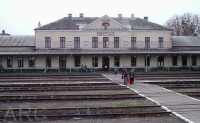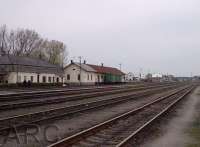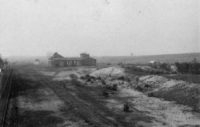On
30 August 1942 a German non-commissioned officer,
Wilhelm Cornides, was in
Rzeszow,
on his way to
Chelm by train.
In his diary he recorded that a railway policeman in
Rzeszow
had told him that ‘a marble plaque with golden letters will be erected on
1 September, because then the city will be "free of Jews".
The policeman also told him that trains filled with Jews "
pass almost daily through the
shunting yards, are dispatched immediately on their way, and return swept clean,
most often the same evening." Some 6,000 Jews from
Jaroslaw,
the policeman added, "
were recently killed in one day."
 |
| Rawa Ruska Station #1 |
Cornides then took the regular passenger train from
Rzeszow to
Chelm,
reaching
Rawa Ruska on
31 August,
and recording in his diary, while staying in the "German House" there:
"
At ten minutes past noon I saw a transport train run into the station.
On the roof and running boards sat guards with rifles. One could see from a distance that the
cars were jammed full of people. I turned and walked along the whole train: it consisted of
35 cattle cars and one passenger car.
In each of the cars there were at least 60 Jews (in the case of the enlisted men’s or
prisoner transports these wagons would hold 40 men; however, the benches had been
removed and one could see that those who were locked in here had to stand pressed
together). Some of the doors were opened a crack, the windows criss-crossed with
barbed wire. Among the locked-in people there were a few men and most of those
were old; everything else was women, girls and children. Many children crowded
at the windows and the narrow door openings. The youngest were surely not more
than two years old.
As soon as the train halted, the Jews attempted to pass out bottles in order to get water.
The train, however, was surrounded by SS guards, so that no one could come near.
At that moment a train arrived from the direction of
Jaroslaw; the travellers streamed toward the
exit without bothering about the transport. A few Jews who were busy loading a car for
the armed forces waved their caps to the locked-in people.
I talked to a policeman on duty at the railway station. Upon my question as to where the
Jews actually came from, he answered:
"Those are probably the last ones from
Lwow. That has been going on now for three weeks
uninterruptedly. In Jaroslaw they only let eight remain,
no one knows why."
I asked: "How far are they going?" Then he said:
"To Belzec." "And then?"
"Poison." I asked: "Gas?" He shrugged his shoulders. Then he said only:
"At the beginning they always shot them, I believe."
Here in the German House I just talked with two soldiers from front-line prisoner-of-war
camp 325. They said that these transports had lately passed through every day, mostly
at night. Yesterday a 70-car one is supposed to have gone through."
 |
| Rawa Ruska Station #2 |
From Rawa Ruska, Cornides took the afternoon train to
Chelm. The things he learned on this journey were so
extraordinary that he made three separate entries in his diary within an hour, the first at 5.30 pm:
"
When we boarded at 4.40 pm an empty transport had just
arrived. I walked along the train twice and counted 56 cars. On the doors had been
written in chalk: 60, 70, once 90, occasionally 40 - obviously the number of Jews
that were carried inside.
In my compartment I spoke with a railway policeman’s wife who is currently visiting
here husband here. She says these transports are now passing through daily, sometimes
also with German Jews. Yesterday six children’s bodies were found along the track.
The woman thinks that the Jews themselves had killed these children - but they
must have succumbed during the trip.
The railway policeman who comes along as train escort joined us in our compartment.
He confirmed the woman’s statements about the children’s bodies which were found
along the track yesterday.
I asked:
"Do the Jews know then what is happening with them?" The woman answered:
"Those who come from far won’t know anything, but here in the vicinity they know already.
They attempt to run away then, if they notice that someone is coming for them. So, for example,
most recently in Chelm where three were shot on
the way through the city." "In the railway documents these trains run under the name
of resettlement transports", remarked the railway policeman. He then said that after the
murder of Heydrich, several transports
containing Czechs had passed through.
Camp Belzec is supposed to be located right on the
railway line and the woman promised to show it to me when we pass it.
5.40 pm. A short halt. Opposite us a transport again stops. I speak with the policeman
in the front of the compartment we ride in. I ask:
"Are you going back home to the Reich?" Grinning, he says:
"You probably know where we are coming from. Well, for us the work is never finished."
Then the transport opposite us moves away, 35 empty and cleaned-out wagons. In all
probability this was the train that I had seen at 1 pm at Rawa Ruska station.
 |
| The Loco Shed |
6.20 pm. We passed camp Belzec. Before then,
we travelled for some time through a tall pine forest. When the woman called, "Now it comes!"
one could see a high hedge of fir trees. A strong sweetish odour could be made out distinctly.
"But they are stinking already", says the woman. "Oh nonsense, it is only the gas", the railway
policeman said laughing.
Meanwhile - we had gone on about 200 metres - the sweetish odour was transformed into
a strong smell of something burning. "That is from the crematory", says the policeman. A
short distance further on the fence stopped. In front of it, one could see a guard house with an
SS post. A double track led into the camp. One track branched off from the main line, the
other ran over a turntable from the camp to a row of sheds some 250 metres away.
A freight car happened to stand on the table. Several Jews were busy turning the disc.
SS guards, rifle under the arm, stood by. One of the sheds was open; one could distinctly
see that it was filled to the ceiling with bundles of clothes. As we went on, I looked back one
more time. The fence was too high to see anything at all. The woman says that sometimes,
while going by, one could see smoke rising from the camp, but I could notice nothing of the sort.
My estimate is that the camp measures about 800 by 400 metres.”
In his diary Cornides recorded conversations he had with other witnesses:
"
On the evening of 30 August 1942
in the 'German House' in Rawa Ruska,
an engineer told me:
"Apart from Poles and POWs, Jews, who in the main have since been transported,
were also employed in connection with the work on the troop drill ground which is situated here.
The work of these building crews (which included women) achieved 30% of the level
of productivity of German workers on average. Whilst some people received bread from
us, others had to find it for themselves. By chance, I recently saw the loading of such
a transport in Lwow. The railroad cars
stood at the foot of an embankment. Using sticks and riding whips the SS men drove
and pushed the people into the wagons. That was a sight which I will not forget as long as I live."
Tears welled in the eyes of the man as he told his story. He was approximately 26 years
of age, wearing the Party badge. A Sudeten German building foreman who sat at the
same table added:
"Recently a drunken SS man sat in our cafeteria, howling like a child. He said that he
was serving in Belzec, and that if things
carried on like this for another 14 days he would kill himself, because he could no longer bear it."
A policeman in the town-hall restaurant in Chelm
on 1 September 1942 said:
"The policemen who guard the Jewish transports are not allowed inside the camp;
only the SS and the Ukrainian Sonderdienst (a police formation comprising
Ukrainian auxiliaries) do so. Thereby, they have created a good business. Recently a
Ukrainian was here who had a great wad of notes, clocks, and gold – everything imaginable.
They find all of this when they gather and ship the clothing."
In answer to the question, in which way were the Jews killed, the policeman answered:
"Someone tells them that they must be deloused. Then they undress and enter a room
into which at first a heatwave is let in, and thereby they already have received one small
dose of gas. It is enough to act as a local anaesthetic. The rest then follows. And then
they are immediately burned."
As to the question, why this whole action has been undertaken, the policeman stated:
"Until now, Jews were employed everywhere by the SS and the Wehrmacht, etc.
as auxiliary workers. Naturally, they heard a lot of things, and furthermore they reported
everything to the Russians. With all of this they had to go. And then they also operated the
entire black market and rigged prices here. When the Jews have gone, prices can
again become reasonable."
Sources:
Gilbert, Martin.
Final Journey: The Fate of the Jews in Nazi Germany, Mayflower Books, New York, 1979
Longerich, Peter.
Die Ermordung der europäischen Juden. Serie Piper 1060, München, 1989











